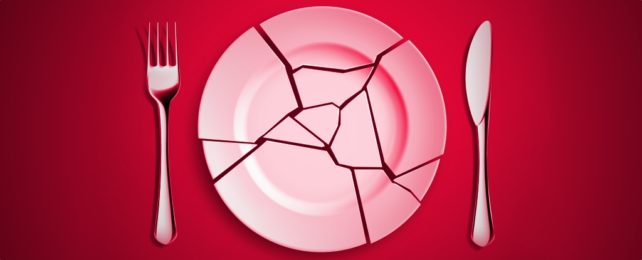In the hustle and bustle of modern existence, it can be all too easy to skip a meal or two. You might even do it deliberately. A new study suggests going without one of the standard three meals a day might have a serious downside.
In a study of 24,011 US adults over 40, only having one meal a day was linked to a higher mortality risk in general. Skipping breakfast was associated with a greater risk of dying from a cardiovascular disease (CVD), while skipping lunch or dinner was associated with a greater risk of all-cause mortality, including a rise in CVD risk.
There was even a problem for those who ate all three meals but had them too close together. Eating two adjacent meals within 4.5 hours of each other was also shown to be linked to increased all-cause death risk.
While the study seems to complicate messages that suggest intermittent fasting could be good for you, the data highlights the importance of regular refueling stops for the body.
"Our research revealed that individuals eating only one meal a day are more likely to die than those who had more daily meals," says epidemiologist Yangbo Sun from the University of Tennessee.
"Based on these findings, we recommend eating at least two to three meals spread throughout the day."
Around 30 percent of the study participants regularly had fewer than three meals a day. According to the data, those who were younger, male, non-Hispanic Black, with less of an education and a lower family income, were more likely to skip meals.
Meal-skipping was also more prevalent among those who smoked more, drank more alcohol, were more food insecure, who ate less nutritious food, had more snacks, and took in less energy overall.
This study isn't comprehensive enough to determine if meal skipping actually causes earlier death, only that there's an association worthy of further research. It's possible that other factors are involved, affecting both eating habits and mortality risk.
That said, the research team did adjust their findings to account for variations in numerous dietary and lifestyle factors, including smoking, alcohol use, physical activity levels, energy intake, diet quality, and food insecurity – and the link was still there.
"Our findings are based on observations drawn from public data and do not imply causality," says epidemiologist Wei Bao from the University of Iowa. "Nonetheless, what we observed makes metabolic sense."
That "metabolic sense" refers to the way that skipping meals set at particular intervals usually leads to taking in more energy at once. This can cause imbalances in the way our bodies regulate glucose, and cause deterioration in the metabolic system.
Recent statistics suggest some 59 percent of men and some 63 percent of women in the US have three proper meals a day. That's a large chunk of the population potentially putting themselves at risk by missing out on breakfast, lunch, and dinner.
Of course, there are all sorts of reasons for this – working hours, time pressures, poverty, different dieting, and fasting approaches – but the team behind the study is hoping that it encourages further analysis of the importance of regular eating.
"Our research contributes much-needed evidence about the association between eating behaviors and mortality in the context of meal timing and duration of the daily prandial [meal] period," says Bao.
The research has been published in the Journal of the Academy of Nutrition and Dietetics.
